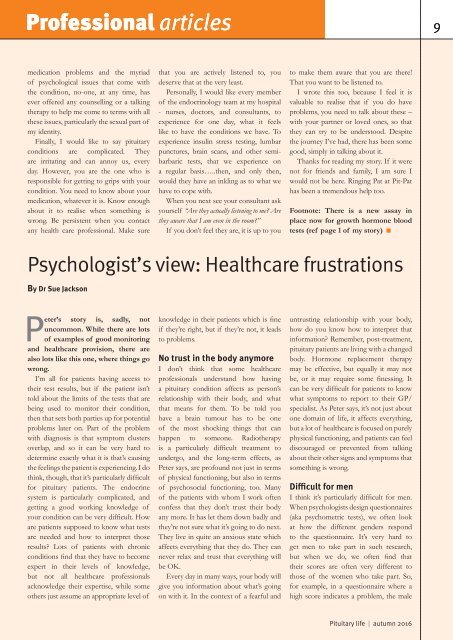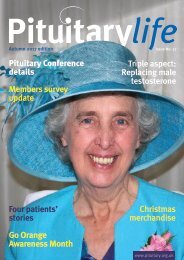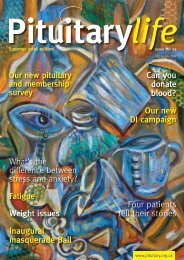Issue 34
You also want an ePaper? Increase the reach of your titles
YUMPU automatically turns print PDFs into web optimized ePapers that Google loves.
Professional articles<br />
9<br />
medication problems and the myriad<br />
of psychological issues that come with<br />
the condition, no-one, at any time, has<br />
ever offered any counselling or a talking<br />
therapy to help me come to terms with all<br />
these issues, particularly the sexual part of<br />
my identity.<br />
Finally, I would like to say pituitary<br />
conditions are complicated. They<br />
are irritating and can annoy us, every<br />
day. However, you are the one who is<br />
responsible for getting to grips with your<br />
condition. You need to know about your<br />
medication, whatever it is. Know enough<br />
about it to realise when something is<br />
wrong. Be persistent when you contact<br />
any health care professional. Make sure<br />
that you are actively listened to, you<br />
deserve that at the very least.<br />
Personally, I would like every member<br />
of the endocrinology team at my hospital<br />
- nurses, doctors, and consultants, to<br />
experience for one day, what it feels<br />
like to have the conditions we have. To<br />
experience insulin stress testing, lumbar<br />
punctures, brain scans, and other semibarbaric<br />
tests, that we experience on<br />
a regular basis…..then, and only then,<br />
would they have an inkling as to what we<br />
have to cope with.<br />
When you next see your consultant ask<br />
yourself “Are they actually listening to me? Are<br />
they aware that I am even in the room?”<br />
If you don’t feel they are, it is up to you<br />
to make them aware that you are there!<br />
That you want to be listened to.<br />
I wrote this too, because I feel it is<br />
valuable to realise that if you do have<br />
problems, you need to talk about these –<br />
with your partner or loved ones, so that<br />
they can try to be understood. Despite<br />
the journey I’ve had, there has been some<br />
good, simply in talking about it.<br />
Thanks for reading my story. If it were<br />
not for friends and family, I am sure I<br />
would not be here. Ringing Pat at Pit-Pat<br />
has been a tremendous help too.<br />
Footnote: There is a new assay in<br />
place now for growth hormone blood<br />
tests (ref page 1 of my story) ■<br />
Psychologist’s view: Healthcare frustrations<br />
By Dr Sue Jackson<br />
Peter’s story is, sadly, not<br />
uncommon. While there are lots<br />
of examples of good monitoring<br />
and healthcare provision, there are<br />
also lots like this one, where things go<br />
wrong.<br />
I’m all for patients having access to<br />
their test results, but if the patient isn’t<br />
told about the limits of the tests that are<br />
being used to monitor their condition,<br />
then that sets both parties up for potential<br />
problems later on. Part of the problem<br />
with diagnosis is that symptom clusters<br />
overlap, and so it can be very hard to<br />
determine exactly what it is that’s causing<br />
the feelings the patient is experiencing. I do<br />
think, though, that it’s particularly difficult<br />
for pituitary patients. The endocrine<br />
system is particularly complicated, and<br />
getting a good working knowledge of<br />
your condition can be very difficult. How<br />
are patients supposed to know what tests<br />
are needed and how to interpret those<br />
results? Lots of patients with chronic<br />
conditions find that they have to become<br />
expert in their levels of knowledge,<br />
but not all healthcare professionals<br />
acknowledge their expertise, while some<br />
others just assume an appropriate level of<br />
knowledge in their patients which is fine<br />
if they’re right, but if they’re not, it leads<br />
to problems.<br />
No trust in the body anymore<br />
I don’t think that some healthcare<br />
professionals understand how having<br />
a pituitary condition affects as person’s<br />
relationship with their body, and what<br />
that means for them. To be told you<br />
have a brain tumour has to be one<br />
of the most shocking things that can<br />
happen to someone. Radiotherapy<br />
is a particularly difficult treatment to<br />
undergo, and the long-term effects, as<br />
Peter says, are profound not just in terms<br />
of physical functioning, but also in terms<br />
of psychosocial functioning, too. Many<br />
of the patients with whom I work often<br />
confess that they don’t trust their body<br />
any more. It has let them down badly and<br />
they’re not sure what it’s going to do next.<br />
They live in quite an anxious state which<br />
affects everything that they do. They can<br />
never relax and trust that everything will<br />
be OK.<br />
Every day in many ways, your body will<br />
give you information about what’s going<br />
on with it. In the context of a fearful and<br />
untrusting relationship with your body,<br />
how do you know how to interpret that<br />
information? Remember, post-treatment,<br />
pituitary patients are living with a changed<br />
body. Hormone replacement therapy<br />
may be effective, but equally it may not<br />
be, or it may require some finessing. It<br />
can be very difficult for patients to know<br />
what symptoms to report to their GP/<br />
specialist. As Peter says, it’s not just about<br />
one domain of life, it affects everything,<br />
but a lot of healthcare is focused on purely<br />
physical functioning, and patients can feel<br />
discouraged or prevented from talking<br />
about their other signs and symptoms that<br />
something is wrong.<br />
Difficult for men<br />
I think it’s particularly difficult for men.<br />
When psychologists design questionnaires<br />
(aka psychometric tests), we often look<br />
at how the different genders respond<br />
to the questionnaire. It’s very hard to<br />
get men to take part in such research,<br />
but when we do, we often find that<br />
their scores are often very different to<br />
those of the women who take part. So,<br />
for example, in a questionnaire where a<br />
high score indicates a problem, the male<br />
Pituitary life | autumn 2016
















